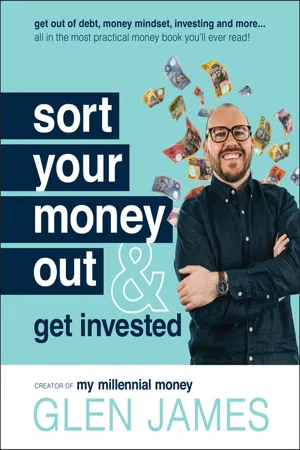
- English
- ePUB (mobile friendly)
- Available on iOS & Android
About This Book
It's time to learn how to manage your money and understand investing
In Sort Your Money Out: and Get Invested, former financial adviser and host of the money money money podcast (formerly my millennial money ) Glen Jamesshares a life-changing approach to the major milestones of your personal finances. Learn how to deal with debt, embrace a realistic spending plan that works, buy your first home, invest in shares and create the plan you need for long-term financial success. You'll get the accessible and friendly help you need to get smart with your money and equip yourself with the skills and tools to understand and secure your financial future and invest in a property, in shares and in yourself.
Written in a matter-of-fact style perfect for anyone who just wants to know what works for them, you'll also learn about:
- Realistic ways to increase your income and help balance your budget
- The methods that lead to a safer, more stable financial future
- The smart way to invest in real estate and purchase a home or investment property
- How to understand the share market, ethical investing, and your superannuation
- Getting out of debt and getting the most out of your life
Ideal for anyone trying to get a handle on their personal finances and get started building a portfolio, Sort Your Money Out is a one-of-a-kind must-read book filled with practical and entertaining financial help to make sense of an intimidating, but crucial, part of everyone's lives.
Frequently asked questions
Information
getting invested
5
learn how to be the wolf of your own street
tl;dr
- To be great at investing you need to have the mindset of an investor.
- You will learn about basic share investing concepts.
- We will look at asset allocation and diversification as well as risk.
- You will understand a variety of different investments and investment styles.

Coroner's formal report on cause of death
Cause of death: no idea what he was doing -
The victim did not have a clear strategy in place. He started investing without financial foundations. -
He saw this investment as more of a gamble after following a ‘hot tip’. -
He didn't really know anything about the company he was investing in. -
The investment was not aligned with his values. If he had actually looked into factory farming, he may have decided that he didn't want to support anything to do with that industry. -
He took on a single stock risk: he invested everything he had in the one investment. There was no diversification whatsoever. -
He took on industry-specific risk and niche within the industry (bio–tech for animals). -
He was exposed to legislative risk (waiting on government approvals). -
He didn't have the view that investing was actually for the long term; it appeared he was speculating. -
He invested in a ‘micro cap’ company (can be very volatile and higher risk than established companies). -
He may have taken on some key person risk within the company he invested in (that is, the main person/s died or left the business).
Coroner's findings ‘The coroner believes that the deceased would have had half a chance of survival if he had done the opposite of every point in my findings. At a very minimum, he would have benefited from a diversified portfolio with the majority of his wealth. If he did have a personal interest in such a company and understood the risks, I would suggest no more than 10 per cent of his wealth be invested in such. May he rest in peace.’ Mindset of an investor: how to be great at investing

Ella, 24
Brisbane

Table of contents
- Cover
- Table of Contents
- Title Page
- Copyright
- Dedication
- hi, I'm Glen!
- introduction
- let's get this party started!
- can we fix it? yes, we can!
- getting invested
- looking at important topics
- where to from here?
- money myths, hacks, luxury items and digital assets
- disclosures
- index
- End User License Agreement